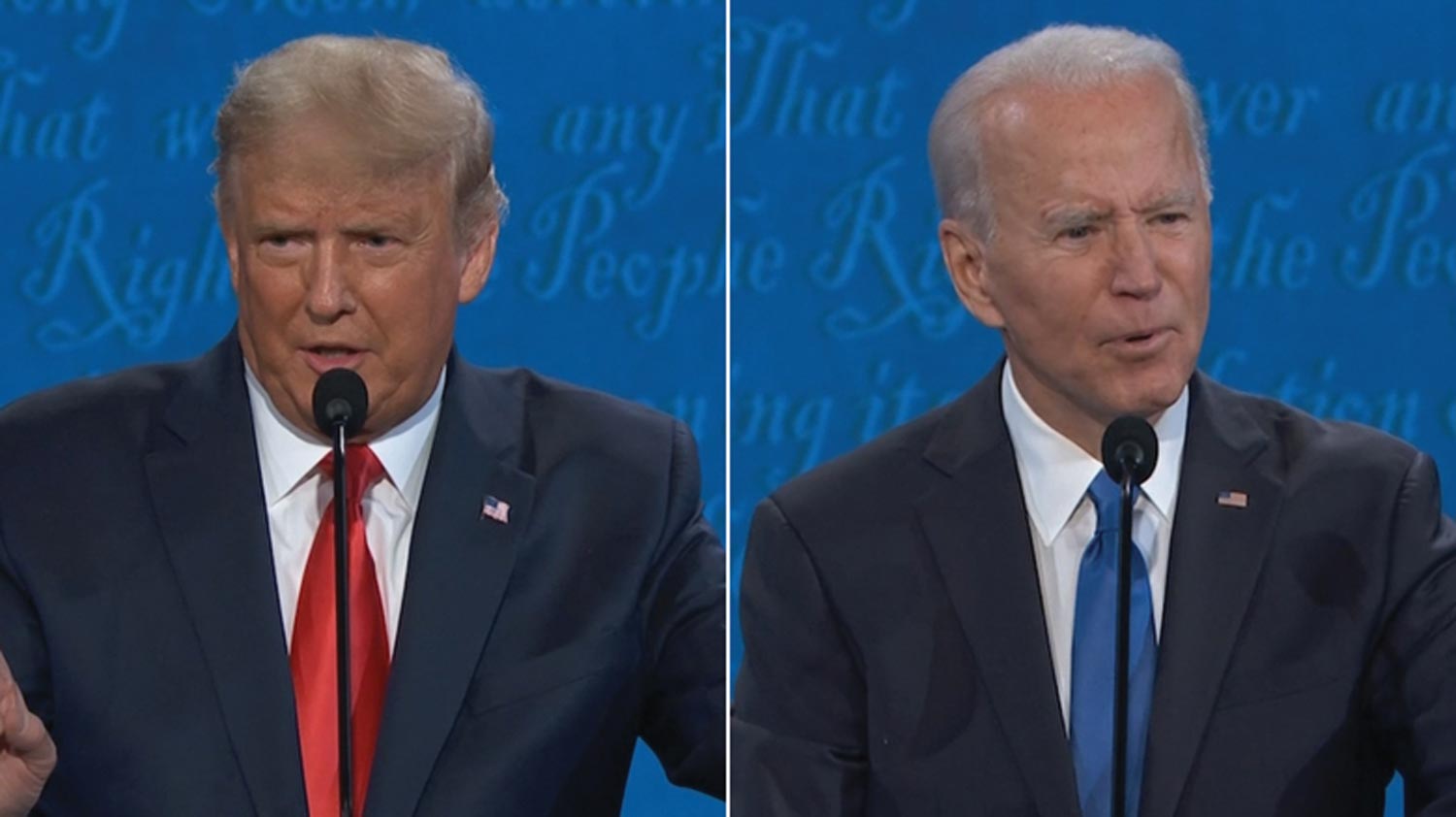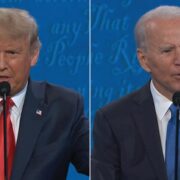
PRESIDENT Donald Trump and former Vice President Joe Biden faced off for the final time on Thursday, October 22, less than two weeks before Election Day.
The two candidates met at their second and final presidential debate — moderated by NBC News correspondent Kristen Welker in Nashville, Tennessee — and made one last pitch to American voters, touching on issues from the ongoing coronavirus pandemic to the U.S.’ relations with China to Hunter Biden’s business dealings.
Thursday’s event came as COVID-19 has claimed over 223,000 American lives, to which, the president defended his administration’s response and deflected blame to China.
“I take full responsibility,” Trump said, continuing, “It’s not my fault that it came here. It’s China’s fault.”
He further vowed that “it’s going away” and that it would be time to reopen the country and that the American public is “learning to live with it.”
The Democratic nominee jabbed, “Come on. We’re dying with it.” He emphasized the toll of the virus and warned that “a dark winter” is coming.
“Anyone who is responsible for that many deaths should not remain as president of the United States of America. I will take care of this. I will end this. I will make sure we have a plan,” Biden said.
The two exchanged countering ideas on climate change and alternative energy sources, replacing the Obama-era Affordable Care Act, and responded to racial and social injustices.
The president claimed that he is the “least racist person in this room,” while his opponent slammed how Trump has characterized the Black Lives Matter movement and previously told the Proud Boys to “stand back and stand by.”
“This guy is a dog whistle about as big as the fog horn,” Biden said.
Trump also criticized Biden’s record, including the latter’s support for the 1994 crime bill, that pushed for severe penalties for drug offenses.
“He’s been in government 47 years, he never did a thing, except in 1994, when he did such harm to the Black community and they were called and he called them super predators, and he said that, super predators,” Trump claimed. “And they can never live that down. 1994, your crime bill. The super predators.” (Fact-checkers have said it was actually then-first lady Hillary Clinton who used the term in a 1996 speech in support of the bill that was signed by former Pres. Bill Clinton.)
The former vice president acknowledged his previous stance was “a mistake” and that he has been “trying to change it since.”
Voter reactions
Following the chaotic first debate last month, new rules were implemented, such as allowing the candidates to speak uninterrupted and a mute function. The 90-minute exchange between Trump and Biden Thursday left some voters feeling like more substance was offered.
“You got to hear more about policy discussions, but I think it was crystal clear that Vice President Biden has the plan to contain COVID, a plan to reopen our economy. He has a plan to get our kids back in school, and has a plan to make sure to reunite this country that’s so divided right now,” said Irene Bueno, a senior advisor for Fil-Ams for Biden-Harris and former official in the Clinton administration, during a virtual spin room following Thursday’s debate.
Kevin Acebo, also a senior advisor for Fil-Ams for Biden-Harris, added, “The person that needed to make the case to America was the incumbent President of the United States, and he failed miserably…He didn’t offer what was his vision for the next four years and if past is prologue, then do you want the next four years to be like these past four years?”
Marc Ang, president of Asian Industry B2B and a local conservative leader in Southern California, told the Asian Journal that Welker’s moderation was fair and helped move the conversation.
“It was a really healthy debate and I want to give props to the moderator,” Ang said. “The American public was able to hear a debate that wasn’t three personalities angling for each other like the first one.”
For Ang, who has been working on a grassroots level to help secure a second term for the president, reopening industries and the economy is one of his top concerns.
“It showed a contrast between Trump who is looking for safety solutions versus Biden who was claiming everything that Trump did was wrong. A country like Sweden didn’t do any of those draconian shutdowns and seems to be doing fine so I think Trump has presented a reasonable point of view while Biden was just trying to score political points,” he said.
Missed opportunities
Michelle De Castro, a Biden supporter from New Jersey, said the COVID-19 conversation should include front-liners and other essential workers.
“We’re talking about front-liners as well, not just the people who have suffered from COVID, who have died from COVID…We’re talking about the percentage of front-liners who are Asian American doctors, who are Filipino nurses and how it directly affects them and with no increased compensation for being on the frontline and I just don’t think that’s been talked about during any of the debates,” she said.
Geri Aglipay, a supporter from the Chicago area, added that the rhetoric and hate crimes that have increased in the Asian American community since the onset of the pandemic could have also been touched upon.
“It’s ironic as Asian Americans and a community of color that [Trump] was making the statement that he’s the ‘least racist person in the room’ when he has, in fact, called COVID-19, ‘Kung flu’ and we’ve seen the rise in hate crimes against Asian Americans, including Filipino Americans,” she said.
During the exchange on immigration, Trump was asked about his administration’s policy of separating immigrant families at the U.S.-Mexico border that has reportedly left 545 children still apart from their parents.
“We’re trying very hard. But a lot of these kids come out without the parents,” Trump said. “They come over through cartels and through coyotes and through gangs.”
However, some Fil-Am voters hoped the topic would have covered other nuances of immigration, such as visa wait times and a pathway to citizenship.
“Enforcing legal immigration laws is an important topic for the Fil-Am community, which was not addressed by both candidates. Our immigration laws are set to create a fair system and protection for all hard-working Fil-Ams first, which is especially important during the pandemic and high unemployment numbers today,” Lisa Noeth, a Republican and small business owner in Las Vegas, told the Asian Journal.
Message to undecided voters
With Asian American voters considered the fastest-growing racial or ethnic group in the U.S. electorate, this election is an opportunity for communities like the Fil-Ams to show its voting power.
Asian Americans are projected to make up 4.7% of eligible voters this year, and among the groups, Fil-Ams make up the second-largest share at around 1.9 million eligible voters, according to analysis from the Pew Research Center.
As voters receive their mail-in ballots or head to the polls to vote for their preferred candidate, supporters from both sides are motivating still “undecided” voters in the community to consider the candidates’ positions and who will help the country to recovery.
On the Republican side, Ang, along with other Fil-Ams for Trump, is continuing to host caravans in Southern California and to raise awareness on California ballot measures, like Prop 16 and Prop 22.
“This is the most important election in the history of the United States. We are all Americans regardless of red versus blue states, our skin color, economic background, gender, and religion,” Noeth said. “We need to unite together to preserve our rights as Fil-Ams, embedded in the U.S. Constitution, for all Americans. As Fil-Ams and the Asian American community as a whole, your voice does matter as your right to vote.”
Fil-Ams for Biden-Harris, as well as other community Democratic groups, will continue having virtual events and phone banking sessions in the last week and a half until November 3.
“If we are to recover from these difficult times, Filipino American families deserve the confidence that the decision being made to protect and help them are made from a leader with both hands on the wheel,” Acebo said. “I think this is a time for steady leadership…that [promotes] hope, empathy and caring. These are values that are embraced by Filipino Americans, our family, our heritage, our culture, and it’s the beauty that our people from the Philippines have brought to the United States.”






